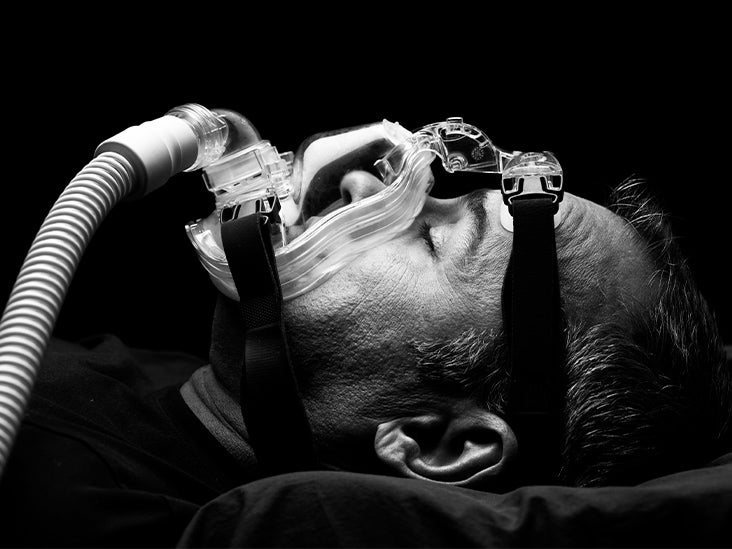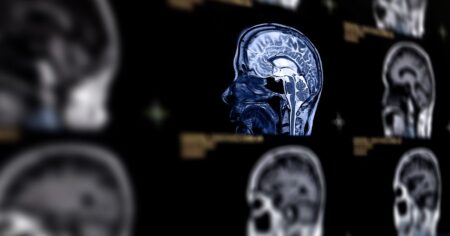- About 936 million people globally have mild to severe obstructive sleep apnea.
- People with obstructive sleep apnea are at a higher risk for other diseases, including cardiovascular disease.
- New research found people with obstructive sleep apnea may be able to reduce their risk of dying from cardiovascular disease if they use a CPAP machine at night.
- Another new study says a CPAP may work better than a weight loss drug in reducing plaque buildup in the arteries around the heart in people with obstructive sleep apnea.
An estimated
Previous research shows those with obstructive sleep apnea are at a
Two new studies recently presented at the European Respiratory Society International Congress provide additional insight into how obstructive sleep apnea affects the heart.
One study found people with obstructive sleep apnea may be able to reduce their risk of dying from cardiovascular disease if they use a continuous positive airway pressure (CPAP) machine at night.
The other study says a CPAP may work better than a weight loss drug in reducing
There are three types of sleep apnea:
- obstructive sleep apnea, which is the most common type
- central sleep apnea occurs when the brain briefly stops signaling the respiratory muscles to breathe
complex sleep apnea is when central sleep apnea develops during the treatment of obstructive sleep apnea
Symptoms of sleep apnea include:
The
Other treatment options for sleep apnea include
Past studies show people with sleep apnea are at a higher risk for cardiovascular diseases, including
Each night, a person with obstructive sleep apnea may stop breathing anywhere between
Each time breathing stops, a person’s oxygen level drops causing stress to the body and more adrenaline to be produced. High adrenaline levels
If a person’s body is constantly under stress as they sleep, the continual bumps in their blood pressure can ultimately damage the blood vessels, leading to clogged arteries and heart issues.
Previous studies show using a CPAP machine to treat obstructive sleep apnea can help lower heart disease risk. For example, past research says people with obstructive sleep apnea who use a CPAP machine have a
Other research found
In one of the studies presented at the European Respiratory Society International Congress, researchers aimed to assess the impact of CPAP treatment on major cardiovascular events in people with real-world obstructive sleep apnea.
“In terms of scientific evidence, the link between obstructive sleep apnea and cardiovascular disease has been widely recognized,” Dr. Jordi de Batlle, a researcher in the Translational Research in Respiratory Medicine Group at the Institut de Recerca Biomèdica de Lleida (IRBLleida) in Lleida, Spain, and lead author of this study told Medical News Today. “Observational studies and studies in the lab show that CPAP treatment could help to prevent the cardiovascular complications of obstructive sleep apnea.”
“For instance, CPAP treatment has been found to be effective in relation to different aspects of cardiovascular disease such as
Researchers analyzed data from more than 3,600 people living in Catalonia, Spain who have obstructive sleep apnea but who had decided to no longer use CPAP therapy. This data was compared to the from another 3,600 people with obstructive sleep apnea who continued to use their CPAP machines.
Scientists found those who continued to use CPAP therapy had a 40% lower risk of dying by any cause, a 36% lower chance of dying from cardiovascular disease, and an 18% decreased risk of being hospitalized with cardiovascular disease.
In the second study, scientists examined the effect of CPAP therapy on
For this pilot study, researchers examined the
Study participants were then randomly assigned either a CPAP machine or injections of weight loss drug liraglutide(Victoza) for 24 weeks.
Upon analysis, the researchers found participants who received just CPAP therapy, as well as those who received both CPAP therapy and weight loss drug injections, had reductions in arterial plaque buildup. Additionally, both groups experienced lessened inflammation in their
Researchers reported study participants who only received the weight loss drug did not experience the same effects.
“People with obstructive sleep apnea are at higher risk of developing plaque in their arteries because their blood oxygen levels fluctuate significantly at night time and their sleep is fragmented,” Dr. Cliona O’Donnell, a specialist registrar in respiratory medicine at St. Vincent’s University Hospital and University College Dublin, Ireland, and lead author of this study explained to Medical News Today. “This increases inflammation, which increases coronary artery disease.”
“We were surprised to see these results because large studies have suggested that CPAP does not improve cardiovascular risk,” she continued. “However, we think that this suggests that maybe if used earlier in the disease course, CPAP may be of benefit. However, these results are only signals that need to be confirmed in larger studies.”
Medical News Today also spoke with Dr. Cheng-Han Chen, an interventional cardiologist and medical director of the Structural Heart Program at MemorialCare Saddleback Medical Center in Laguna Hills, CA, about these two studies, who said these are both steps in the right direction.
“For a long time we’ve [known] that there is a connection between sleep apnea and a lot of what we call
In regards to Dr. de Batlle’s study, Dr. Chen said he would like to know why people in the study stopped using their CPAP machines.
“(For next steps in this research) you would want to replicate these kinds of studies in other locations besides one region in Spain,” he added. “You’d want to see if you’d be able to get the same admission for the rest of the world.”
For Dr. O’Donnell’s study, Dr. Chen commented although the pilot study was small, it did report what seemed to him to be a large effect.
“This is definitely one that is interesting … it’s definitely something that would make us want to do much larger studies just to see if this effect is real,” he added.
Read the full article here











